
In a significant political move, Senate Minority Leader Chuck Schumer, D-N.Y., announced on Tuesday that he is placing a hold on all Trump Justice Department nominees. This decision comes amid growing concerns regarding the administration's plan to accept a luxury jet from Qatar intended for use as Air Force One. Schumer described the situation as "deeply troubling" and expressed his desire for more transparency surrounding what he deems an unethical deal.
On the Senate floor, Schumer articulated a series of probing questions that he insists the Trump administration must address before he lifts his hold on the nominees. He questioned President Trump's claim that the jet is "a free jet," asking for clarification on whether the plane would arrive fully equipped with necessary security measures. Schumer's inquiries included, "If this is, as President Trump promised, a free jet, will the Qataris pay for those highly sensitive installations, or will American taxpayers cover the cost?"
While Schumer's hold cannot outright block these nominees, it serves to delay their consideration, raising questions about the broader implications for judicial appointments. Many of Trump's nominees have faced similar holds for various reasons, suggesting a pattern of political maneuvering within the Senate.
According to a senior official from the Department of Justice (DOJ), the Office of Legal Counsel prepared a memo asserting that accepting the plane was legal, a conclusion approved by Attorney General Pam Bondi. However, the DOJ has declined to make this memo public, further fueling Schumer's call for accountability. He demands that Bondi testify before Congress to clarify why the gift does not constitute a violation of the emoluments clause, which mandates congressional approval for such transactions.
Schumer stated, “The Attorney General must testify before both the House and Senate to explain her decision and answer questions related to this gift.” He emphasized that until he receives satisfactory answers, he will maintain his hold on all political nominees to the DOJ.
Beyond the jet deal, Schumer criticized the DOJ for its handling of the Foreign Agent Registration Act, claiming that the unit responsible for enforcement must take action not only in this case but also concerning all foreign dealings involving President Trump and his associates. This raises broader questions about the integrity of the administration and its transparency with the American public.
In response to Schumer's announcement, a White House spokesperson accused him of prioritizing politics over critical DOJ appointments, labeling these actions as obstructionist to President Trump's "Make Safe Again" agenda. The spokesperson stated, “Cryin’ Chuck must end the antics, stop Senate stonewalling, and prioritize the safety and civil rights of Americans.”
Before embarking on a trip to the Middle East, President Trump defended the decision to accept the airplane gift, referring to it as “a very nice gesture.” He mentioned that the plane would eventually be decommissioned and given to his presidential library. Trump remarked, “I would never be one to turn down that kind of an offer,” emphasizing his view that rejecting such a gift would be unwise.
The situation has drawn scrutiny from legal experts, many of whom question the implications of accepting a gift from a foreign government, especially one that could raise potential conflicts of interest. Concerns are amplified by the Emoluments Clause, which prohibits the president from receiving payments or gifts from foreign officials without congressional approval. Lawmakers and former intelligence officials have pointed out the espionage risks associated with such gifts, recalling historical instances where foreign presents concealed surveillance devices.
As this controversy continues to unfold, it highlights the ongoing tensions between the Trump administration and Congress, particularly regarding ethical standards and foreign influence in American politics. The outcome of Schumer's hold on DOJ nominees may set a precedent for how such issues are addressed in the future.